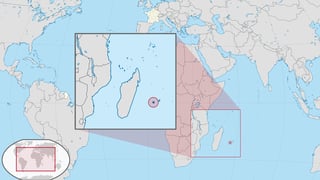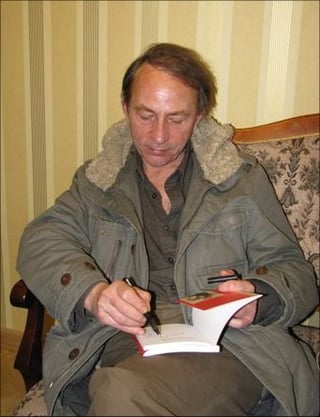Like many other readers, we’re not quite sure what to make of Michel Houellebecq. And if we enjoy reading one of his works of fiction, or if we find his work inspiring, do those sentiments reflect somehow upon our own politics? These are complicated questions, of course, and if you’re not familiar with Houellebecq, you might be wondering why we’re even asking them in the first place. To give you a quick primer: a recent headline in The Guardian* read: “Michel Houellebecq: ‘Am I Islamophobic? Probably, yes.’” The writer has been described as “the ageing enfant terrible of French literature,” and The Guardian tells us that he “has been under 24-hour police protection since the Charlie Hebdo attack.” At the same time, Iggy Pop has found musical inspiration in Houellebecq’s work and, well, we think Iggy Pop is cool. Want to decide for yourself? We’ll tell you a little bit more about Houellebecq first.
Early Life in Colonial La Réunion
 Houellebecq was born in 1956 on La Réunion, an island in the Indian Ocean that’s in close proximity to Madagascar and Mauritius. The island has a long recent history of colonialism, first of Portuguese so-called “discovery” in the 16th century and followed soon after by French colonization. French is still the official language in La Réunion, and the island remains a “region” of France to this day. During his childhood, Houellebecq lived with his grandparents for a short time in Algeria, another nation marked by the violence of French colonization. By all accounts, these experiences must have given the author a nuanced window into minority rights with regard to the empire of France, right? Looking at Houellebecq’s fiction and his own statements, it seems the answer is, simply, not really. But we’ll get into that more shortly.
Houellebecq was born in 1956 on La Réunion, an island in the Indian Ocean that’s in close proximity to Madagascar and Mauritius. The island has a long recent history of colonialism, first of Portuguese so-called “discovery” in the 16th century and followed soon after by French colonization. French is still the official language in La Réunion, and the island remains a “region” of France to this day. During his childhood, Houellebecq lived with his grandparents for a short time in Algeria, another nation marked by the violence of French colonization. By all accounts, these experiences must have given the author a nuanced window into minority rights with regard to the empire of France, right? Looking at Houellebecq’s fiction and his own statements, it seems the answer is, simply, not really. But we’ll get into that more shortly.
Houellebecq wrote poetry in his early life and published his first novel, Whatever (1994), at the age of 36. Several years later, Houellebecq published his second novel, The Elementary Particles (1998), which launched him into the international spotlight. His books demonstrate in some ways the influence of science fiction writers like H.P. Lovecraft while also reflecting Houellebecq’s interest in novelists such as Dostoevsky and Balzac.
The Publication of Platform and Houellebecq’s Rise to Infamy
 By the time Houellebecq’s novel Platform (2001) was published, readers outside France already knew his work. However, it was this novel—and the subsequent lawsuit linked to Houellebecq’s statements about it—that have really cast a bright spotlight on the French writer. The novel depicts a terrorist attack by Islamic extremists, and the protagonist reflects, at one point in the book: “Every time I heard that a Palestinian terrorist, or a Palestinian child or a pregnant Palestinian woman, had been gunned down in the Gaza Strip, I felt a quiver of enthusiasm at the thought of one less Muslim.”
By the time Houellebecq’s novel Platform (2001) was published, readers outside France already knew his work. However, it was this novel—and the subsequent lawsuit linked to Houellebecq’s statements about it—that have really cast a bright spotlight on the French writer. The novel depicts a terrorist attack by Islamic extremists, and the protagonist reflects, at one point in the book: “Every time I heard that a Palestinian terrorist, or a Palestinian child or a pregnant Palestinian woman, had been gunned down in the Gaza Strip, I felt a quiver of enthusiasm at the thought of one less Muslim.”
In an interview about the novel, Houellebecq told an interviewer, “Et la religion la plus con, c’est quand meme l’Islam.” A subsequent interview in The Paris Review** explained that “an unsatisfying mild translation is ‘Islam is the stupidest religion.’” Houellebecq was the subject of a civil rights lawsuit accusing him of hate speech after he made the comment. Although he won the case—“on the grounds of freedom of expression,” according to The Paris Review—the incident follows him.
And Houellebecq hasn’t stopped writing such incendiary fiction. To be sure, his most recent novel, Submission (2015), depicts a futuristic France in which an Islamic political party rises to power. Are you unsure about what to make of Houellebecq and his fiction? We recommend reading some of it for yourself and deciding whether the work is so significant that it might overcome the press surrounding the author.
*Read the full Guardian article here. **Read the full Paris Review article here.









